Echoes of the Reconstruction: Weekly Caucasian Opposing Grant
ECW is pleased to welcome back Patrick Young, author of The Reconstruction Era blog.
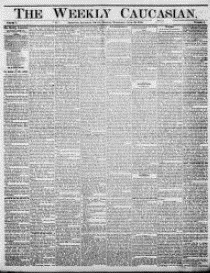
The Weekly Caucasian newspaper from Lexington, Missouri was a staunchly Democratic newspaper. Supporting the virtues of the Confederacy, applying the lessons of “The Lost Cause” to Missouri, and aggressively advocating the program of the Democratic Party made it into one of the most-read rural newspapers in America.
I thought that it might be useful to get a sense of how the changes brought by Reconstruction and the Election of 1868 looked through the eyes of this rural newspaper. Here is more information on the paper from the Library of Congress:
Published in Lexington, Missouri, the first issue of the Weekly Caucasian appeared on April 25, 1866…The paper changed editors and proprietors numerous times before Henry Davis became sole owner and changed its name to the Weekly Caucasian, the third and last name change the paper made before ceasing publication and consolidating with the Lexington Weekly Intelligencer in 1875…The Caucasian was a weekly 4-page paper that was pro-White, pro-South, and Democratic in its politics.
I wanted to take us away from the big city newspapers that I usually draw articles from to give a sample of articles from a rural Border State paper opposed to the Radical Reconstruction program. Some of the articles use language that is offensive.
Opposition to Reconstruction in Missouri was primarily opposed to the growing strength of the Republican Party in the country and the empowerment of Blacks, only recently freed from slavery. While the state had never left the Union, many of its white native-born men had fought for the Confederacy.
The articles in 1868 were opposed to Ulysses S. Grant’s candidacy for President, against advancing civil rights for Blacks, and in favor of using violence as a principal mode of maintaining conservative control in the state. This article suggests that a “carpet bagger” be lynched for giving speeches to Blacks.
Weekly Caucasian
Saturday, Aug 29, 1868
Lexington, MO
Vol: 3
Page: 3
The next article takes aim at U.S. Grant, nominee of the Republican Party for president. It uses the rumor of Grant’s heavy drinking to suggest that he will “never be sober enough” to “stand” on his political platform.
Weekly Caucasian
Saturday, Aug 01, 1868
Lexington, MO
Vol: 3
Page: 3
The Caucasian claimed in August an increase in support for the Democratic ticket of Seymour and Blair. In fact, the Democrats would be defeated in the Fall.
Weekly Caucasian
Saturday, Aug 01, 1868
Lexington, MO
Vol: 3
Page: 3
A local election in July of 1868 saw a Democrat elected. The Caucasian saw in this victory a sign of growing disaffection with the Republicans.
Weekly Caucasian
Saturday, Aug 08, 1868
Lexington, MO
Vol: 3
Page: 2
Local Democratic clubs often published meeting notices in the Caucasian which explained the Republican Party’s platform as “mis-rule, negro equality, and in favor of equal taxes.”.
Weekly Caucasian
Saturday, Aug 08, 1868
Lexington, MO
The pages of the Caucasian were also used to attack the liberal press. Here, Frank Leslie comes under attack.
Weekly Caucasian
Saturday, Aug 15, 1868
Lexington, MO
Vol: 3
Page: 3
The newspaper also warned of secret goings-on between the local African American community and what a later generation of white nationalists would call “outside agitators” but to whom the Caucasian referred to as “carpet baggers.”
Weekly Caucasian
Saturday, Aug 15, 1868
Lexington, MO
Vol: 3
Page: 4
For the first three years of Reconstruction, only whites in most parts of the South were able to vote. 1868 would mark a change in voting in the old Confederacy, with many states seeing large increases in the number of men participating in voting. By the 1872 Election, the 15th Amendment would be passed and Black voting became commonplace-until a new plan was hatched to deprive the Blacks of their power under a system of democracy.

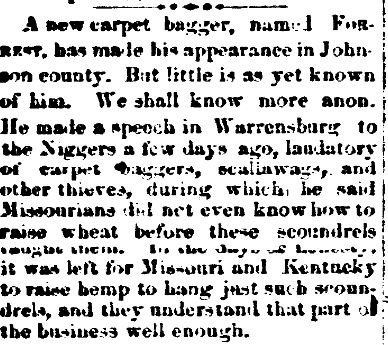
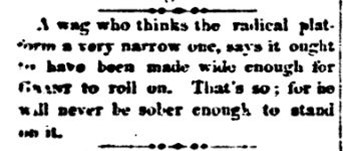
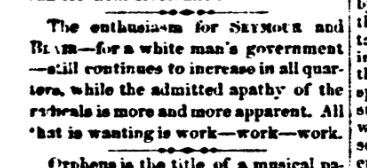
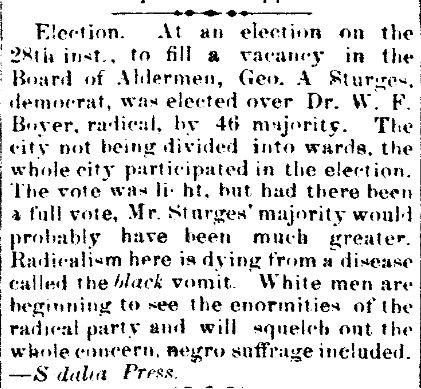
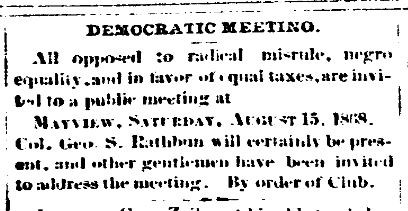
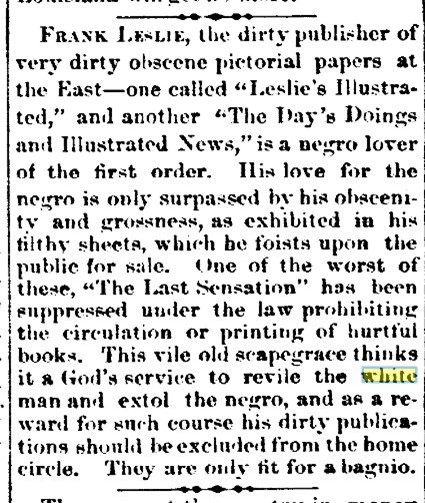
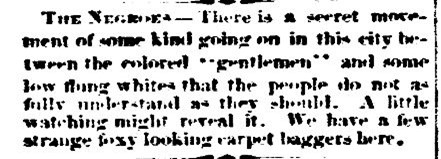
Very enlightening
Thanks grandadpookers.